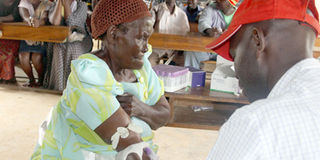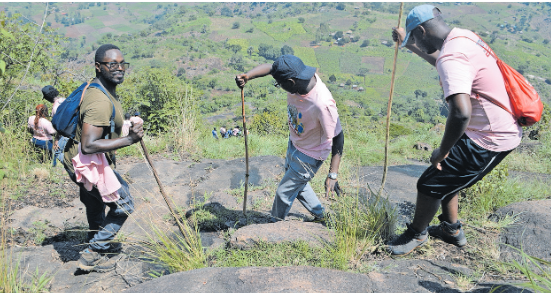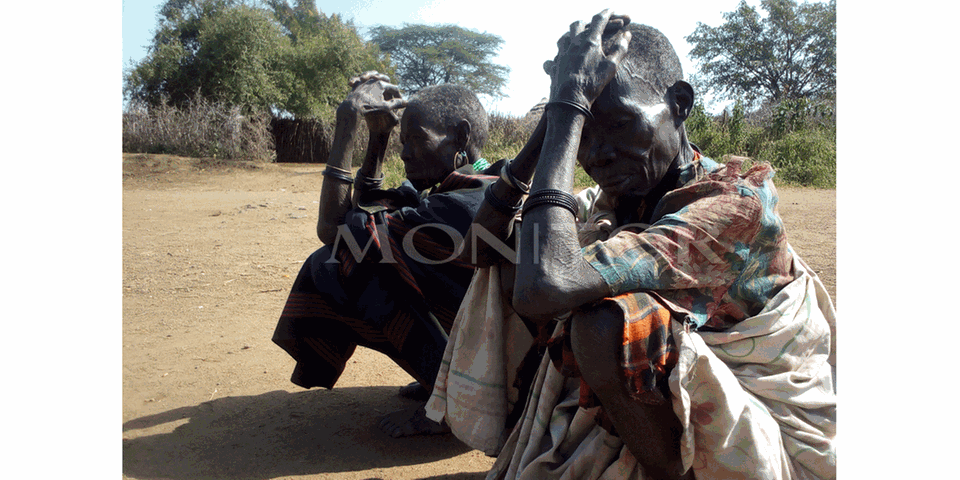Prime
The psychological scars of Aids

Ms Margaret Namuddu (L) takes part in a voluntary testing and counselling exercise in Mutungo, a Kampala suburb on Thursday. PHOTO BY ISMAIL KEZAALA
What you need to know:
On Thursday, December 1, 2011, the annual World Aids Day came and with it a reminder of one of the grimmest and unfortunately still ongoing chapters in modern history.
Over the years, HIV/Aids has been taken up by the NGO world to the extent that to many people, it is one of those many boring “World” days, like World Food Day, World Water Day, Women’s Day, World Refugees Day and so forth, associated with seminars, workshops and media billboards and what is most emphasised is the messages of prevention, treatment, counselling, and control.
In all this chatter about HIV/Aids, something very rarely discussed is its psychological toll on Ugandan society and the scars it has left across the nation, one of the world’s first epicentres of the calamity.
How have millions of Ugandans struggled to cope with the tremendous psychological stress, helplessness, despair and pain brought on by this unusual illness? In its path, HIV/Aids has left empty homes, uncountable orphans, elderly citizens taking care of grandchildren, teenage children fending for siblings just a few years younger than them.
Uganda got independence in 1962. Next year will be 50 years since independence. This means by next year, half of Uganda’s history will have been spent under the cloud of the HIV/Aids plague.
Many have succumbed to Aids
Well-known radio DJs, athletes, politicians, army and police officers, musicians, school teachers, civil servants, businessmen, social celebrities, girls who dazzled many with their beauty, and a range of people public and not-so-public have departed from us.
Although it was first positively identified in the southwestern United States and Haiti in June 1981, in the southern Ugandan town of Rakai the first major cases of this wasting disease started getting noticed in 1982.
Amid all the wars, military coups, poverty and other crises in Uganda since 1982, HIV/Aids has cast the longest shadow over national life. There is practically no single family in Uganda or even Black Africa that can claim not to have lost a single immediate or extended family member to HIV/Aids.
It brought with it that euphemistic expression, “He is sick,”, and in Uganda we leave it at that. Most people know what we mean when we explain that so-and-so is “sick” without further elaboration. A deep sense of fatalism and sadness still hangs over the land.
The saddest part of HIV/Aids is the children, born with the HIV. The tragedy of children orphaned by HIV/Aids is itself a whole other matter, but nothing causes more anguish than the children born with it. We see them playing happily, knowing nothing about their plight.
One wonders which is the worse tragedy, early death to HIV/Aids or, as a primary school child told UBC (Radio Uganda) on World Aids Day on Thursday, children like her have to take antiretroviral drugs daily, for the rest of her life?
We start to understand many things about Uganda since the late 1980s when we look at the country’s history through the eyes of this epidemic.
When the National Resistance Army led by Yoweri Museveni seized state power in January 1986, most of the guerrilla army’s commanders and foot soldiers were young men below 30. Relief at having survived the brutal guerrilla war led many of these NRA soldiers into a life of sexual promiscuity - and most of them to early deaths.
Many commanders who did not perish in that first wave of HIV/Aids deaths between 1985 and 1989 could not believe the cruel hand that fate had dealt them. Bitterness and anger overwhelmed many of them and some started acting almost suicidal.
Many staged highway robberies. Some soldiers opened fire on a spouse, then themselves. Others went on a looting rampage that has not stopped to this day.
Scourge linked to corruption
The anger and denial of being HIV+ among many senior government and military officials in part sheds light on the levels of corruption in Uganda that cannot be explained in any rational way.
It also explains why certain NRA military commanders unleashed an almost maniacal reign of terror on the residents of northern and northeast Uganda during the counterinsurgency operations of 1986 to 1994.
Some of these NRA commanders were to go on to fight the 1990-1994 Rwandan Patriotic Front war and as it was with the NRA in northern Uganda, some of the atrocities reportedly committed by RPF commanders can be traced to this rage over their HIV/Aids status.
We have read about government officials and army officers who make off with entire budgets and payrolls of ministries and army divisions. A level of corruption that goes far beyond even what naked greed permits and starts to look like an angry scorched earth lashing out at Ugandan society.
Many thousands of Ugandans have actually gone, literally, mad, part of the effects that HIV/Aids has on the mind. The number of newspaper and radio news stories on apparently normal men and women in towns and villages all over Uganda doing the craziest things, from beating up a child to death or a man selling his child for Shs20,000 are more than just bizarre acts.
The desperation around HIV/Aids in part explains why, by coincidence, starting around 1986 there was and continues to be an explosion in the number and flock of Pentecostal Christian churches. With their emphasis on divine miracles and faith healing, the Pentecostal movement offered hope and a clutching after straws for the millions for whom there simply exists no hope at all besides God.
Many Ugandans prominent on the social scene, on testing positive simply vanished to Europe, Canada and the United States for an indefinite stay just to get away from all the gossip and stigma that come with it.
Media and political commentators have been puzzled for years at how passive Ugandans are in the face of power cuts, pot holes in their roads, abuse of power by the government. Once again, HIV/Aids becomes one key to understanding this passivity.
Many middle class professionals who would have gladly taken part in protest marches or been outspoken about the political situation have to think through everything. If one gets arrested and has to spend months or years in prison, will they still receive their antiretroviral drugs?
Even if they do, will they have the same balanced diet necessary to go with the drugs? This is the same reason many employees cling onto their jobs no matter how much they are exploited. Life is difficult enough even with a job. How much more difficult and shaky would it be if one had no job but depends on these life-saving drugs?
Citizens left numb
For a population that has endured about 25 years of weekly burials of HIV/Aids victims, watched family members, office colleagues and friends wither away and die or nursed them at home and in hospital, the trauma of this has left Ugandans numb.
In an odd way, some of the happy-go-lucky attitude among Ugandans, who seem to remain cheerful in spite of all their problems, can also be traced back to HIV/Aids and the extremes of light-heartedness that tragedy sometimes drives people to.
After this scale of tragedy, nothing could be worse. Not rigged elections, not power cuts, not inflation, not police tear gas. After losing half one’s children to HIV/Aids in the space of a few years, one turns into a walking corpse, emotions numb, the mind listless.
After this, nothing more matters.
The story of the catastrophe that HIV/Aids has become in Black Africa should be written about for generations to come, in music, made into films, and forever told.
HIV/Aids has done several times more damage to Africa than the 15th Century Trans-Atlantic slave trade did. It requires an Alex Haley “Roots” book and TV series to capture the psychic effect on us all. It is an incredible story.




